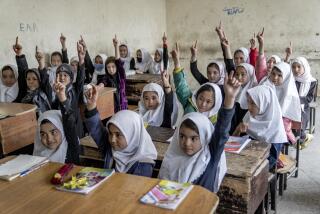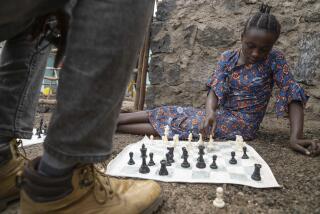Education Stops Cold for the Children of War
- Share via
Millions of American parents and children are now enjoying the last days of summer vacations--camp, backyard barbecues, baseball, long days at the beach--before thoughts turn to school. However, for millions of refugee children around the world, a forced “summer vacation” from school carries the threat of becoming a permanent vacation.
“The moment I became an orphan my life stopped,” says Stefanie, a young Rwandan girl living in a muddy refugee camp outside Gisenyi. At 15, she heads a seven-person household and attends classes “sometimes.” Mostly she looks after the six other children in her house.
Eighty percent of the world’s 35 million refugees and internally displaced persons are women and children (those forced from their homes, but not their country). And for all too many, the civil wars and conflicts that have torn apart their countries and deprived them of their families, homes and security now threaten to deprive them of a basic human right, the right to an education. From continent to continent, the voices of refugee women echo: “Peace and education for our children is what we want most.”
“I would like him to get more education,” a Burmese refugee mother says of her 10-year-old son. “But for [our] family to survive, I have to ask him to work soon.”
It’s a dilemma faced by refugee families worldwide. The forced interruption of education because of war and poverty creates a vicious cycle. Unless children are given educational opportunities, they will not develop the skills they need to be productive adults and effective leaders, and many are recruited into armed groups or forced into prostitution.
Children’s access to education during and after war is consistently overlooked by decision-makers focused on fueling or containing the conflict, or rebuilding infrastructure. The urgent need for rebuilding and restructuring cannot be overlooked, but all that will serve little purpose without an able and educated future generation. Decisions on education should be made in tandem with those of other human necessities like food, shelter and medical care.
Also, education for refugees often comes too late. More and more, it is proving essential in children’s psychological and social healing that education be provided in the early stages.
In Rwanda, where a third of the population is between 11 and 20 years old, and adolescents like Stefanie head thousands of households, enrollment in secondary education was just 7% in 1998, way below the already bleak sub-Saharan average of 26%. A Women’s Commission for Refugee Women and Children delegation to the Kigali Model Secondary School in Rwanda this year found that no one had books, not even the teacher. Yet that didn’t stop 14-year-old Umugwemza Epophia from quickly raising her hand to answer questions in biology class. She wants to become a teacher or a doctor. Headmistress Emeritha Nzaramba had more immediate goals. “My dream,” she said, “is to have a textbook for every five students.”
A continent away, in Myanmar (formerly Burma) and in Thailand, another commission delegation heard about the lack of educational opportunities for refugees and the internally displaced. “I wish to attend school to have an opportunity to go to university. I wish to help my people,” says a 17-year-old Burmese refugee girl living in Bangkok. But her widowed mother does not have such hopes. “I always thought that my children would do better than I have; now I know this will not be possible,” she says in despair.
This issue is one of more than passing humanitarian interest (although that alone should be enough to spur international action). If the countries and communities these children are growing up in are to be spared never-ending cycles of war, poverty and violence, the world community has to speak up.
More than 15 million refugee and internally displaced children do not have schoolbooks or teachers this school year. Let’s call on our government and other governments to reduce this number by half by next year.
More to Read
Sign up for Essential California
The most important California stories and recommendations in your inbox every morning.
You may occasionally receive promotional content from the Los Angeles Times.












